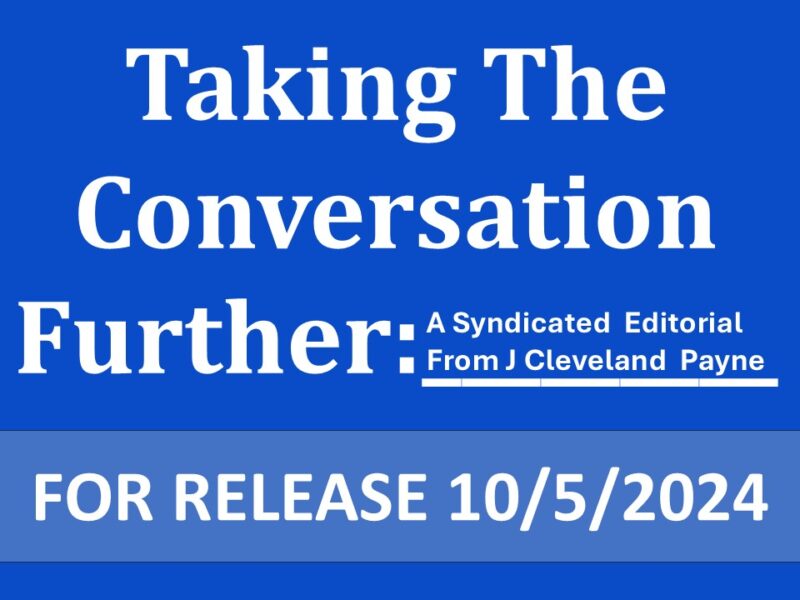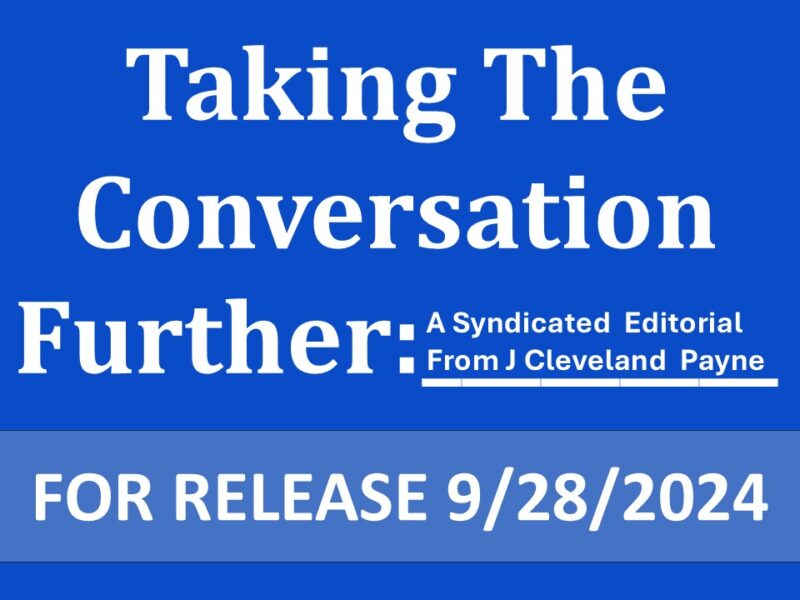FOR IMMEDIATE RELEASE
September 14, 2024
Contact:
J Cleveland Payne
More Better Media, LLC / The Conversation Project
http://thisistheconversationproject.com
theconversationinbox@gmail.com
Headline:
Two Wrongs Making A Larger Conversations On Wrongs: Taking The Conversation Further Syndicated Column For Release September 14, 2024
Subheadline:
On A Big Football Sunday, The Nation Is Hijacked By Talk Of “The Talk” And Traffic Stops
[Little Rock, Arkansas] — Was an entitled athlete roughed up a little? Did a Miami police officer decide today was the day to push a narrative? Was there racism on both sides?
Before a home game for the Miami Dolphins, star wide receiver Tyreek Hill found himself in an altercation that no one expected, but everyone has an opinion on. Just yards away from the players’ parking lot entrance, Hill was pulled over by Officer Danny Torres of the Miami Police Department. What began as a routine traffic stop quickly spiraled into a situation that left both Hill and Torres pointing fingers.
What we remember is what we saw—first, the shaky bystander video that circulated on social media, showing Hill being detained on the side of the road, right outside the stadium. It looked more like a scene from a viral cop drama than a minor traffic stop. Then came the bodycam footage released by the police, providing a more in-depth look into the incident. This wasn’t just another celebrity getting stopped on the way to work; it was a collision of ego, race, and power dynamics that left everyone debating who was at fault.
In the immediate aftermath, Tyreek Hill downplayed the situation. At the post-game press conference, after celebrating a touchdown with a handcuff-simulation dance, he gave a casual, aw-shucks account of the incident, claiming to have been fully compliant. However, after the bodycam footage was released, Hill walked back some of his comments, acknowledging that his behavior could have been better. Despite this, he still called for the firing of Officer Torres.
The video paints a slightly different picture from Hill’s initial account. While it’s clear that he wasn’t on his best behavior, the officer’s actions also raise questions. Was Officer Torres following proper protocol? Should he have been more patient, knowing the heightened scrutiny that would come with pulling over a high-profile Black athlete (and did)? Or did Hill’s status as a celebrity athlete add fuel to Torres’ approach?
Tyreek Hill was ultimately cited for careless driving, but that’s just one layer of this complicated story. The citation came after Hill was initially stopped for allegedly speeding. Hill’s legal team argued that Officer Torres escalated the situation unnecessarily. According to Hill’s attorney, the wide receiver felt targeted, not just for his race but also for his status as a high-profile athlete in Miami. This isn’t the first time an incident like this has happened, and it likely won’t be the last.
However, recent revelations have added more layers to the narrative. Hill’s attorney now claims that the wide receiver didn’t even realize he was being pulled over at first, as he was only seconds away from entering the Dolphins’ players’ parking lot. That could explain his initial frustration but doesn’t entirely excuse his behavior.
With Officer Torres, he is no stranger to controversy. According to newer reports, Torres has been suspended six times throughout his career, with documented misconduct issues on that list. This detail complicates things further, especially for those who see this as another case of racial profiling and police overreach. It’s easy to see how this situation has been widely interpreted as a power struggle, one that happens far too often when police officers pull over people of color, especially those in high-profile roles.
In this case, both sides carry their share of blame. Tyreek Hill’s reaction was less than stellar, and he admits that. He could have de-escalated the situation by keeping his cool, but in a high-pressure moment like this—just moments away from a major NFL game—it’s understandable why emotions ran high. Hill was, after all, on his way to do his job, and being pulled over likely felt like a disruption he didn’t need.
And Officer Torres didn’t handle the situation as delicately as he could have. The decision to pull Hill out of the car, especially given his reputation and past suspensions, raises eyebrows. Should Torres have allowed Hill to explain himself? Could the situation have been resolved without escalating to a roadside detainment? It’s hard to say, but the evidence suggests that Torres’ actions contributed to the tension.
This situation brings to mind something many drivers of color know all too well: “The Talk.” It’s the conversation Black parents have with their children about how to act when stopped by the police to prevent a situation from escalating. The reality is that, for many people, the stakes are higher because of their race, their status, or even the car they drive. Tyreek Hill’s experience might seem trivial on the surface—a careless driving citation—but it taps into a much deeper issue of how race, power, and policing intersect in America.
As someone who belongs to this demographic and has seen my fair share of flashing blue lights in the rearview mirror, I can tell you this is a very real fear. Whether you’re an NFL star or an everyday person, the rules of engagement feel different. And while Officer Torres should have handled the situation better, Hill’s celebrity doesn’t absolve him of his behavior either.
Ultimately, what happened to Tyreek Hill shouldn’t have escalated the way it did, but neither party is blameless. Hill acted out in an unnecessary way, and Officer Torres, with his checkered history, could have exercised more caution and respect in his approach. Unfortunately, this incident only reinforces the long-standing tensions between police officers and people of color, especially those who drive flashy cars or carry some level of fame.
So, what’s the lesson here? Sadly, there isn’t one. This is just another case of a situation that should have been handled better on both sides but ultimately wasn’t. And that is the most frustrating part of all.
About More Better Media, LLC & The Conversation Project:
The Conversation Project is a news and information-gathering project that operates under More Better Media, LLC (MBM). MBM has a bold commitment to help expand the world’s knowledge base, striving to provide high-quality content that educates, informs, and inspires. The Conversation Project produces Things You Might Not Have Heard, a weekday morning newscast, and a digest of popular stories showcased over the week called The Weekly Wrap. Both can be found at http://thisistheconversationproject.com.
For Media Inquiries: J Cleveland Payne
Owner / Producer
501-240-9670
theconversationinbox@gmail.com



